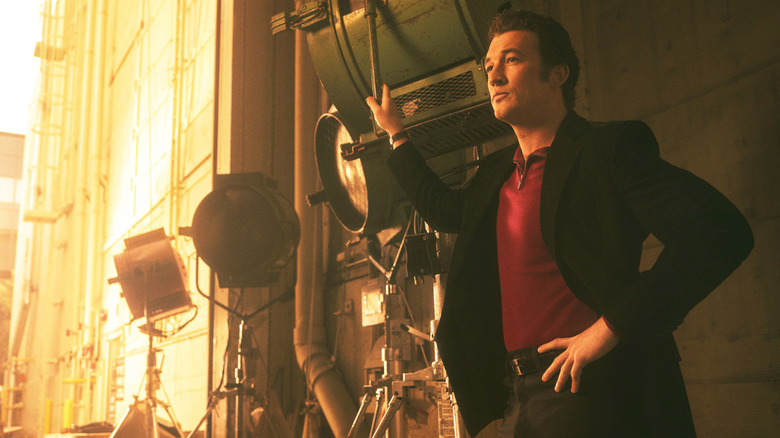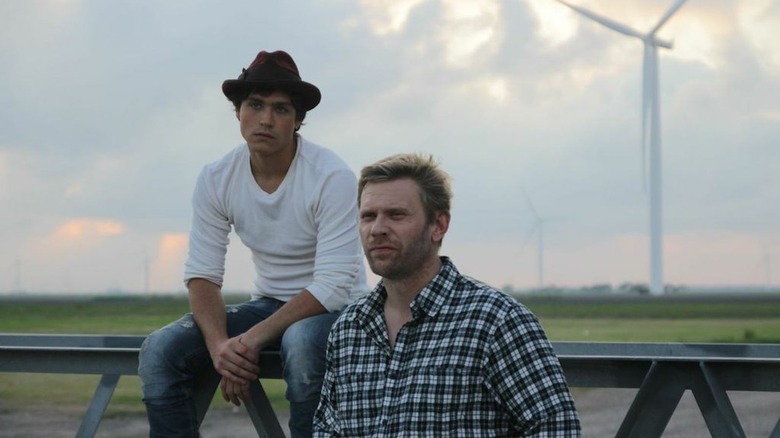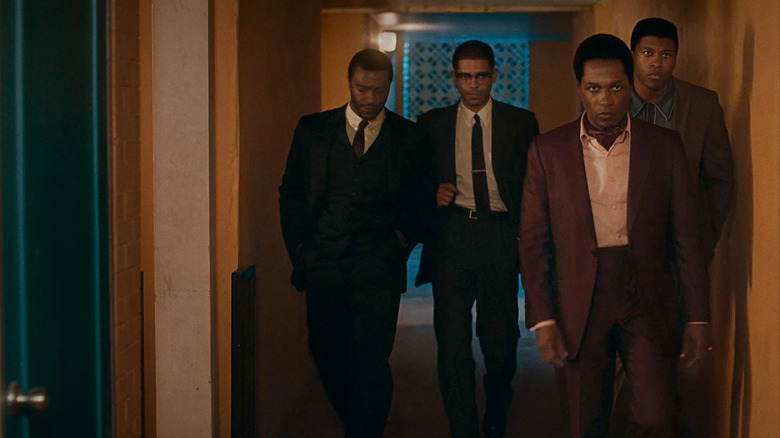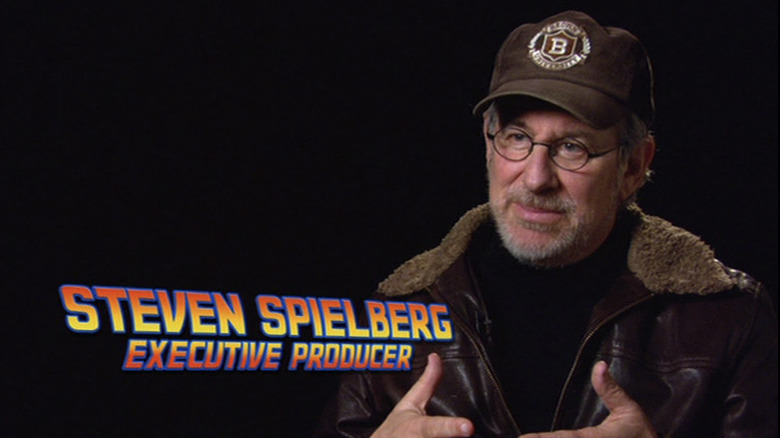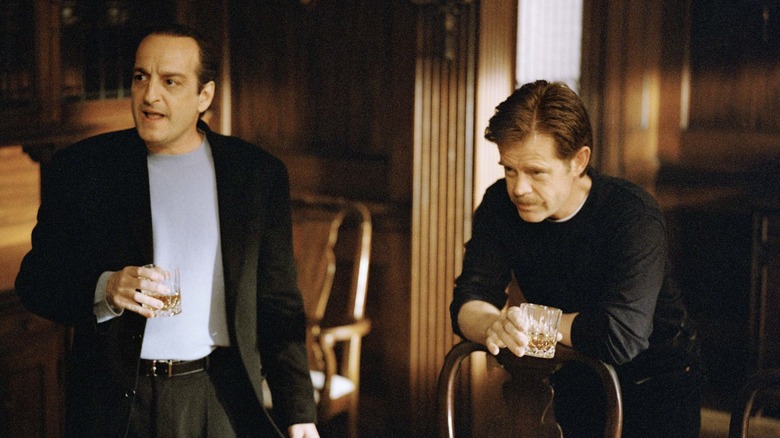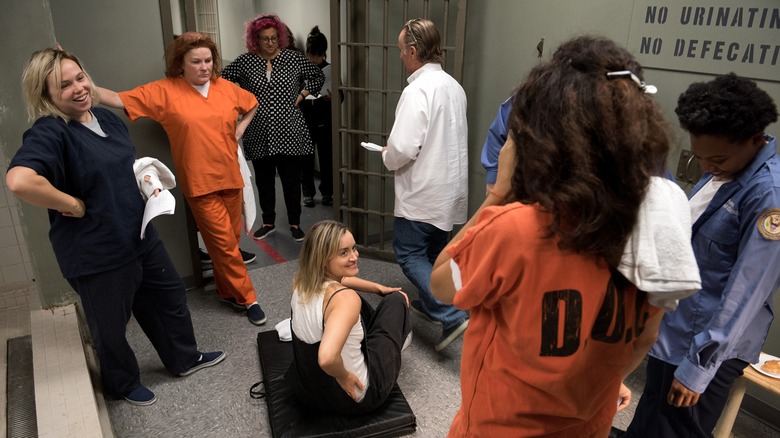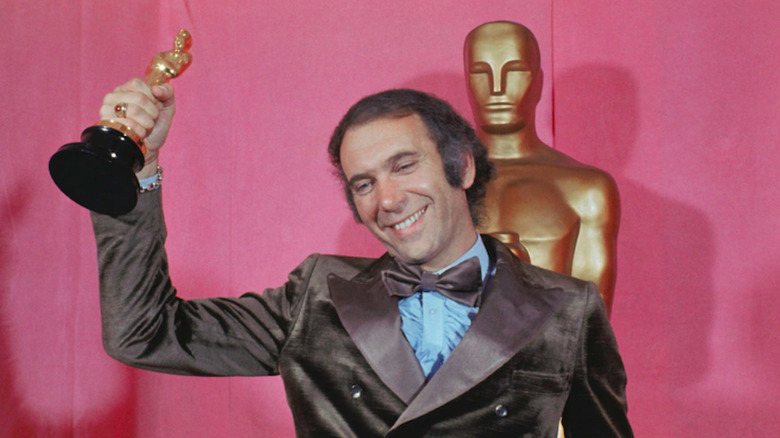What Does A Movie Producer Do, Actually? Explaining Cinema's Most Confusing Job
Movie and television credits are, by and large, self-explanatory. Actors act, directors direct, and designers design whatever it is they design (sets, costumes, sound, etc.). Some of these off-camera credits aren't always fully representative of who was most responsible for a film/show's artistic quality (the list of screenwriters denied credit via the Writers Guild of America's murky arbitration process is long and distinguished), but at least in theory, the casual viewer knows what these people did.
The same cannot be said of producers.
To the film and television fan who's never read a behind-the-scenes account of how these entertainments get made, the role of the producer can seem awfully nebulous. To people who've been covering the industry for decades, the role of each credited producer can at times seem equally unclear. What differentiates a producer from an executive producer? Doesn't "co-producer" sound an awful lot like an "associate producer?" Are all of these producers needed on set, and can some of them really be that involved when they're credited on several projects per year?
There is a method to this multi-credit madness. These various types of producers do have defined levels of involvement. Is it always clear-cut? Absolutely not! But I was able to chat with a few seasoned film and television producers who helped make basic sense of the producing profession, and I think you'll be surprised how sensible it all can be. In theory.
Please note that this is a primer on film and television production. There are exceptions and caveats to the assigning of each credit, but the insights below should give you the lay of the land. I'll break them down individually in order of importance (as agreed upon by the majority of industry professionals): producer, executive producer, co-producer, and associate producer. Then our experts will explain how producing for television is a very different beast.
The role of the producer in development
It's often said that every movie and television show starts on the page, but that isn't always true. The kernel of a project can be just about anything, and, for Brian Udovich, who's worn a multitude of hats as the co-producer of such films as "All the Boys Love Mandy Lane" and "The Wackness," producer of "Bad Turn Worse" and, most recently, executive producer of "We're All Gonna Die," this is ideally where his job begins.
"What makes a producer is you have to own something other people want," says Udovich. "That can be an idea, that can be a comic book, that can be a book, it can be somebody's life rights ... it doesn't matter what it is. It could be a podcast, it could be a movie, it could be a TV show, anything like that. If you own that thing, then you have a poker chip to play with."
Udovich cites 10-time Academy Award nominee Scott Rudin as the one-time master of this approach. (Rudin's illustrious career appears to have ended in the wake of multiple misconduct and abuse allegations.) "On his level, you'd be taking it around and shopping it to studios, which ostensibly are banks, saying, 'I own this book. I need money. I think this will turn into a very profitable film.' The bank evaluates it, they give you the money to go do it. They think it's worth a certain amount of money. Now it's on you to go deliver it that way, and that is the most bare bones way to look at this. Independent film, same thing. I am going to produce this film in the absolute definition of the word producer."
From there, Udovich likens the pecking order to the world of professional sports, where the studios are the owner, the director is the coach, and the producer is the general manager. "Your job is to go figure out the coach," he says, "to figure out who the best person to guide this is, to help draft the players and casting people and [...] building everything around it. This is why the Oscar goes to the producer, because they're the ones that, at the end of the day, were responsible for starting this thing and delivering this thing and seeing it all the way through. The producer is the first one in and the last one out."
And once you're in, that's where the hard, boots-on-the-ground work of producing begins.
The role of the producer in physical production
Just as directors and actors approach their craft differently (typically depending on how they were trained or, in some cases, learned their discipline on the fly), producers have varying philosophies regarding how best to ensure their director feels supported in realizing their vision while making sure the production stays focused and, most importantly, on schedule. Because when a production falls behind schedule, that means days are added to the shoot. And never has the axiom "time is money" been more applicable.
For Keith Calder, the co-founder of Snoot Entertainment with his wife and producing partner Jess Wu Calder who's produced films as diverse as "You're Next," "Blindspotting," and Regina King's "One Night in Miami," an ideal shoot is the boots-on-the-ground payoff for having been onboard from the inception of project. He cites the filming of director Adam Wingard and Simon Barrett's 2014 sci-fi/horror/action gumbo "The Guest," the team's follow-up to the sleeper slasher success of "You're Next," as a particularly rewarding experience in this vein.
As Keith recalls, "Simon had this old script sort of sitting around that tied into an idea that Adam wanted to explore, which was this sort of 'Terminator' type aesthetic." After expanding on this concept with Wingard, Keith, and Jess, Barrett wrote the screenplay that allowed this "core group" of four to set up shop in New Mexico, where they shot a lean and very mean genre flick.
"It's one where our involvement really was essentially from concept through delivery through release. It was really just overseeing the whole thing, putting together the financing, selling it, and all the business side of it. But also, creatively, there every single day at the monitor, working with Adam and Simon and the actors. And [...] breaking out and helping each other."
"It's problem solving and thinking outside the box," says Jess, which can be especially precarious when working on a production with a smaller budget (as they often do). But these challenges are what makes the job worthwhile for her. "I think it's so amazing when, amidst all of this, I get a chance to just focus on this tiny screen on the monitor, and then you see everyone's hardworking vision just all come together in this kind of beautiful way. And so, on the screen, everything is beautiful and effortless. All around, I also get to see everyone pulling it all together, and I think that's really special."
The role of the Executive Producer
An executive producer might sound like they belong at the top of the totem pole — and when the EP in question is Steven Spielberg, they certainly are in terms of the film industry's overall power structure. Indeed, this credit grew in significance during the 1980s when Spielberg became a brand via his Amblin Entertainment production company. As the executive producer of "Gremlins," "The Goonies," "Back to the Future," and so on, he lent these films an air of importance. They were events.
But once you get beyond that kind of fanfare and bombast, the executive producer's involvement in the making of a film, while important, is much less intimate than the producer's.
"You can make these things up because there's no laws," says Udovich. "But traditionally, a lot of the time, the executive producer was much more financially involved than they were in the creative or physical making of it. So these are people that put in a bunch of money and came in as an executive producer, or this is 'Steven Spielberg's executive producing this. So he's not there day to day, but he's part of this film. He's going to help mentor it. You get into trouble, you can give him a call, he'll help throw his weight around, but he's not there every single day doing this stuff.'"
Is this all starting to make a little bit of sense? Great, because in a moment I'm going to explain how the producer and executive producer credits are completely different in television. But before we get there, let's finish up with the last two producing credits you frequently see over the titles of a movie.
The role of the Co-Producer and Associate Producer
The last two credits in order of importance are murkier than the top two. The co-producer is definitely more vital to the making of a movie, though how they impact a production can differ from project to project.
According to Udovich, "Co-producer, traditionally, has been much more on the 'I physically made this film' side. So you're doing more than a line producer or unit production manager, but it's much more [...] 'I was on set every single day. We made sure the trains ran on time, we did all of this stuff, but I didn't own the rights to this thing.'"
For the Calders, this credit recognizes the work done by Snoot Entertainment executive Chris Harding. "Every movie I do is multiple producers," says Calder, "Because I produce with my wife who's my producing partner, and we have [Harding], who gets a co-producer credit. It's normal."
And then there's the associate producer credit, which can acknowledge a whole range of responsibilities relating directly or a tad tangentially to the making of a film. Per Udovich, "There was an old joke in Hollywood that the associate producer is a person that associates with the producer." My favorite joke regarding the dubious role of the associate producer is uttered by the dearly missed character actor Lionel Mark Smith in David Mamet's savage showbiz satire "State and Main": "It's what you give to your secretary instead of a raise."
All joking aside, Udovich says the associate producer is a reward for being integral in some facet of the film's production. "This is a credit you give away as something of a thank you. This is a 'Hey man, couldn't have made this without you.' But don't make any mistake about it: This person was not the sole reason this movie got made."
How producing credits are different in television
When it comes to producing, Udovich says, "Television and film are Spanish and Portuguese: Similar languages, not the same language." To understand why, Udovich says you have to look all the way back to the small-screen medium's earliest days. "Television was basically a device that made you stick around to watch commercials," he says, "And they put the power in the writers."
The ultimate power in twenty-first century television is wielded by the executive producer, who is typically the showrunner. Think Damon Lindelof on "Lost" or Jenji Kohan "Orange Is the New Black" or Taylor Sheridan on "Yellowstone." The executive producer could be the creator or, once the creator moves on to other projects, the next senior writer who takes over showrunning duties.
But there are still non-writing producers in television, and this distinction isn't necessarily reflected in the actual credit. As Keith notes, "If it's a writing producer, it usually refers to how senior they are in the writers' room on that show. Or if they were a writer who created or co-created the show, even if they're not involved anymore, they may still end up with the credit for that. And then for non-writing producers, like with us on 'Blindspotting' in season 1, we were non-writing producers. We were there the whole time, through the writing, the production, and the post. We were sort of overseeing it the same way we would a movie."
If you want to know which producer writes, which producer writes as well as produces, and which producer simply produces (not that there's anything simple about that), you'll have to delve further into the behind-the-scenes details. In this age where television writers are worshiped like A-list filmmakers, it's not that hard to figure out who did what. But it is a prime example of how the producing credit can be more of a catch-all nowadays than it was in the past.
Why do producers produce?
As Udovich explained above, filmmaking is a creative impulse that's about identifying a good story that's worth telling, which often starts by hooking up with talented writers and directors who have something special to share with the world but lack the resources to bring it all together on the scale they've envisioned. To bring this all together, producers typically require the money, savvy, and hard work of those other kinds of producers we've briefly discussed.
Does it always fit together perfectly and make as much sense as I've tried to illustrate in this article? Nope. Producing can get utterly chaotic (especially when you have a headstrong A-list movie star like, say, Bruce Willis running the show). But when the effort results in the production of a quality motion picture that connects palpably on an emotional level with moviegoers, every single headache suddenly feels worthwhile.
For Udovich, the Calders, and most of their colleagues, producing movies and television is a calling. It's a unique creative profession where they can be both enablers and collaborators. As Jess puts it:
"I love being a producer because ... this is going to sound super corny, but when we work with a first-timer, there are times where it's really incredible to watch them grow over the course of [the production], but also to get to be part of that process, and figuring out like, 'Oh, they might be really strong in this one area, but how can I help them? How can I assemble the most amazing team around them to help get their vision across?' When all the pieces come together in that kind of way, I get really excited. I think that's the job of a producer, just in general: Being able to come into a project and be like, 'I see we have this and this, but what if we added something over there, and sprinkle some paprika over there? What can we do?' I do really love that."
Point blank: Every story begins on the page, but that's where it will stay without a producer. And now, hopefully, you have a better idea of what, on a variety of levels, producers really do.
